About Us
.jpg)
For more than 75 years, people across Kentucky have put their trust in Kentucky Farm Bureau Insurance. Today, our company protects more than 462,000 Kentucky families and businesses with our top-ranked insurance products.
We employ approximately 700 people across the state of Kentucky, and our State Office is located in Louisville. We’ve also got agency offices in all 120 counties of Kentucky.
At Kentucky Farm Bureau, there are endless ways to unlock your career potential. No matter your expertise, we’ve got a position that’s right for you.
Want to see KFB’s workplace culture in action? Click here to follow us on LinkedIn.
We have opportunities in eight different areas at the state office. Explore the drop-down menus below for more information.
The 120: Adair County
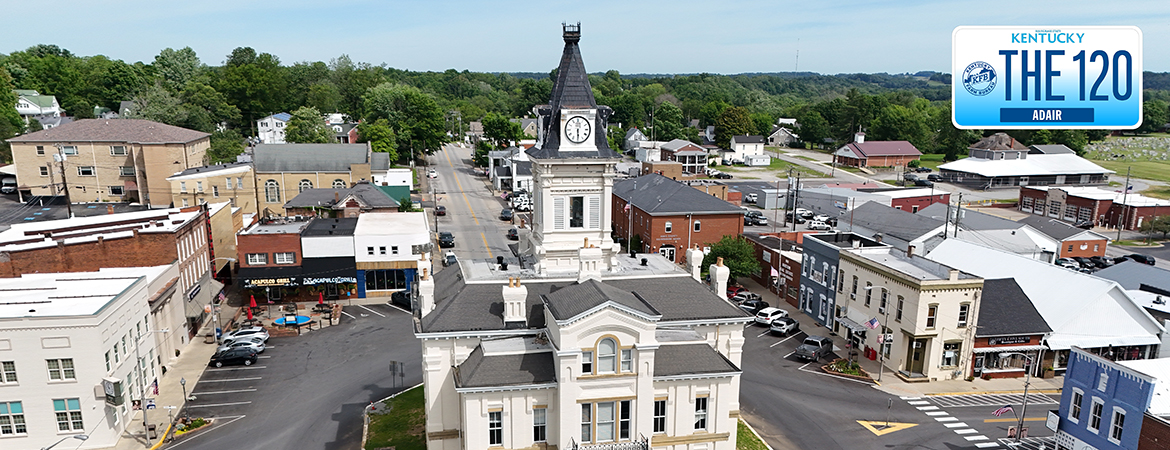
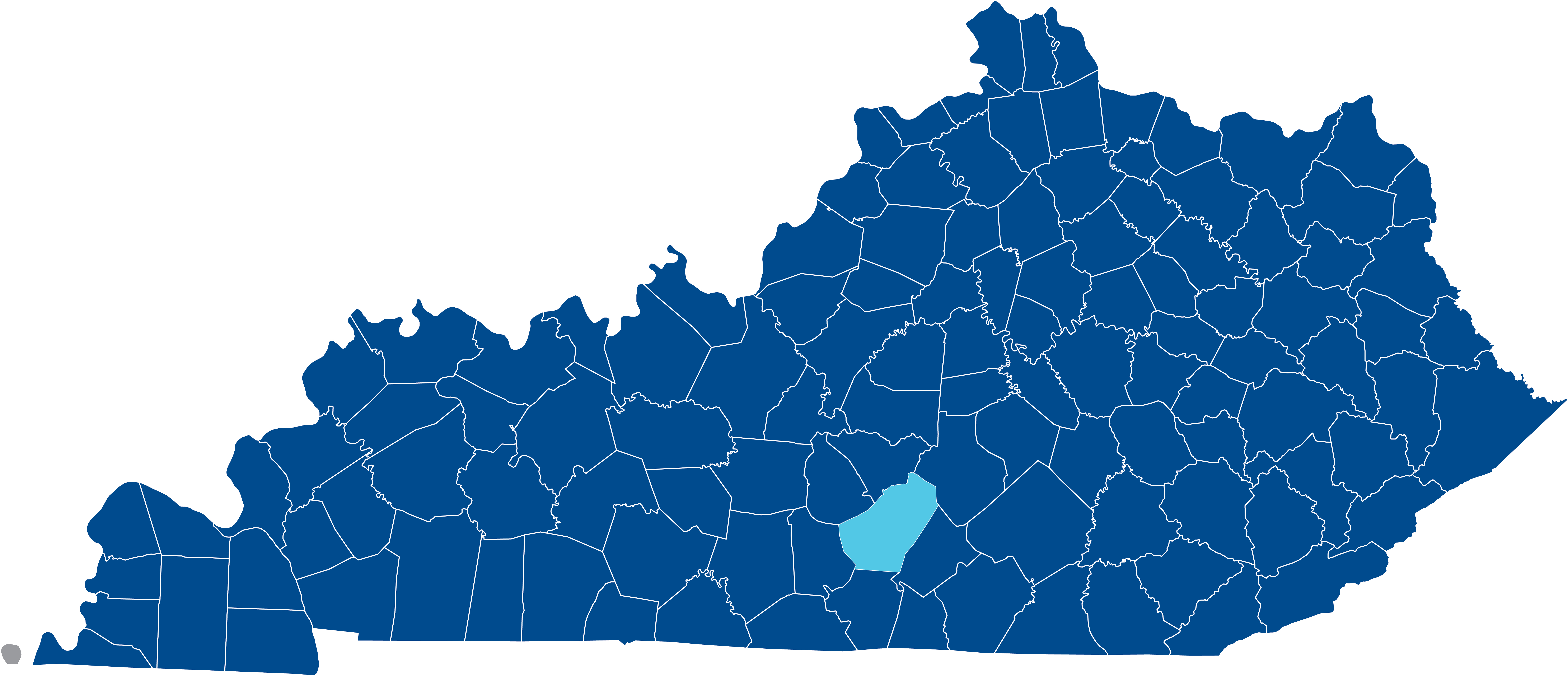 Adair County in South-Central Kentucky is nestled among some of Kentucky’s most well-known bodies of water, making it a hub for lake lovers. Bask in the sun or cast a line at the 8,210-acre Green River Lake, highly regarded by outdoor recreationists as an ideal spot for fishing, hiking, biking, horseback riding, paddling, and birding. You may even spot a bald eagle, which have been observed during all months of the year but are more readily viewable during the winter months (with peaks in January and February). Visitors or residents of Adair County also enjoy easy access to Lake Cumberland, Dale Hollow Lake, and Barren River Lake, all just a short drive away.
Adair County in South-Central Kentucky is nestled among some of Kentucky’s most well-known bodies of water, making it a hub for lake lovers. Bask in the sun or cast a line at the 8,210-acre Green River Lake, highly regarded by outdoor recreationists as an ideal spot for fishing, hiking, biking, horseback riding, paddling, and birding. You may even spot a bald eagle, which have been observed during all months of the year but are more readily viewable during the winter months (with peaks in January and February). Visitors or residents of Adair County also enjoy easy access to Lake Cumberland, Dale Hollow Lake, and Barren River Lake, all just a short drive away.
The great outdoors not your thing? That’s okay! The county seat, Columbia, has loads of small-town charm to show off. Every Saturday morning from May through October, hit the town square for a farmers market featuring loads of local farm fresh meats, fruits, vegetables, and more. Enjoy some southern hospitality at Betty’s Country Cooking, a favorite stop for friendly service, comfort food favorites like biscuits and gravy, and their wildly popular dessert pies, or enjoy a delicious meal at Anderson’s Pizzeria, where live music is on the menu most every weekend. Walk the historic downtown and pop into local shops, like the Nanwood Market, a family-owned boutique that has home goods, gifts, and even serves coffee and tea! See historical gems like the Adair County Courthouse, which is wonderfully preserved and listed on the National Register of Historic Places, and the Trabue Russell House, which was built in the 1820s and has a medicinal garden maintained by Adair County Extension Master Gardeners.
Adair County is also home to Lindsey Wilson College, a vibrant liberal arts college founded in 1903. A central point of the beautiful, pastoral campus is the John B. Begley Chapel, designed by the late world-renowned architect E. Fay Jones, a disciple of the legendary American architect Frank Lloyd Wright.
And while you are in the area, be sure to visit one of the Kentucky Farm Bureau Certified Farm Markets in Adair County: Holiday Farm Market and Penn Country Hams.
Hometown agents. Because personal service still matters.
For your convenience, Kentucky Farm Bureau Insurance has multiple offices located in Adair County. Click here for more information.
The 120 is a blog produced by Kentucky Farm Bureau highlighting each of Kentucky's 120 counties—because we're well-known for knowing Kentucky well.
The 120: Allen County
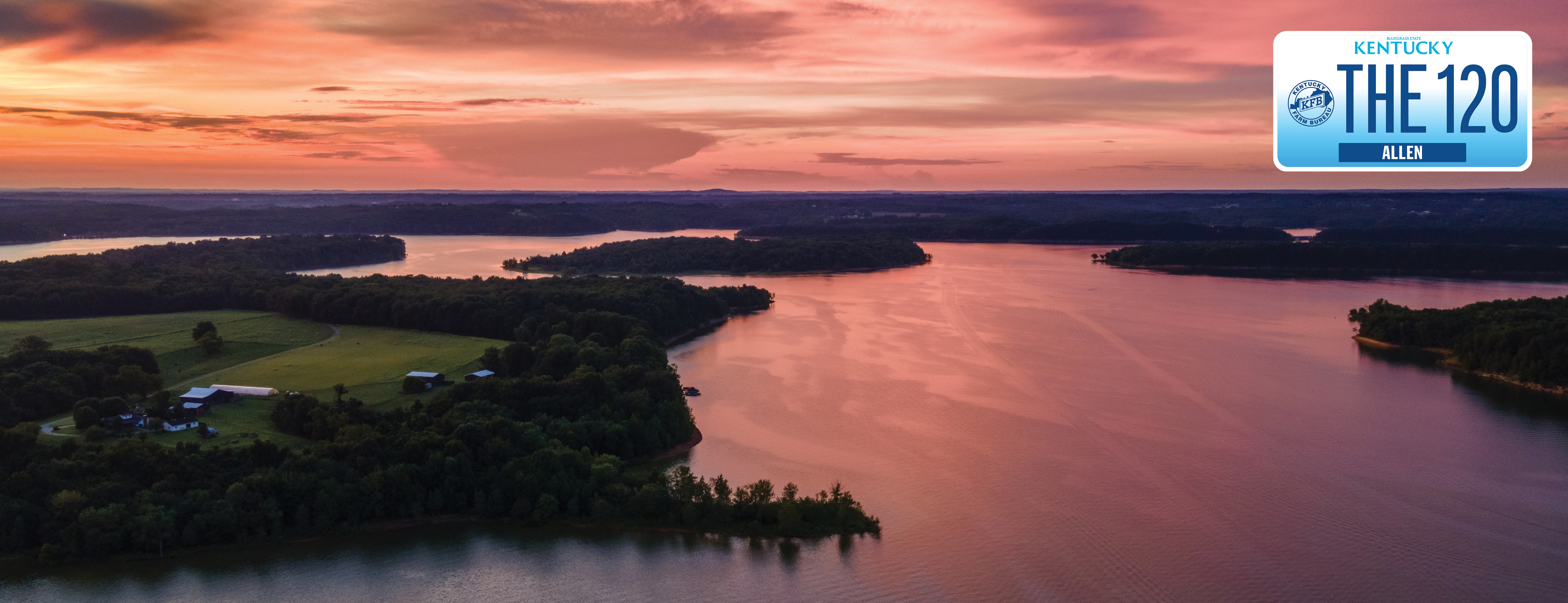
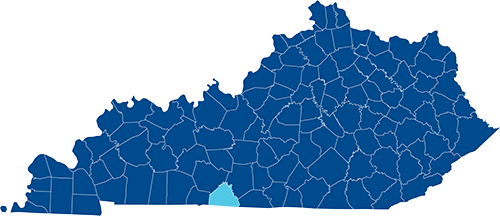 Situated along the border of Tennessee, Allen County’s rural, rolling hills are an oasis for those seeking a little down time. Wind down and enjoy the native grass fields hugging Barren River Lake, where camping, hiking, and birding are popular pastimes. Spot indigo buntings and bald eagles during the day, and hear the hoot of the barred owl at night. With 10,000 surface acres of water, there are endless ways to experience the lake. Four boat ramps/recreational areas are located in the county, each offering unique ways to enjoy the natural world:
Situated along the border of Tennessee, Allen County’s rural, rolling hills are an oasis for those seeking a little down time. Wind down and enjoy the native grass fields hugging Barren River Lake, where camping, hiking, and birding are popular pastimes. Spot indigo buntings and bald eagles during the day, and hear the hoot of the barred owl at night. With 10,000 surface acres of water, there are endless ways to experience the lake. Four boat ramps/recreational areas are located in the county, each offering unique ways to enjoy the natural world:
- Bailey’s Point is open April through October and, with 215 sites, is the largest of the Army Corps of Engineers’ campgrounds on Barren River Lake. Enjoy waterfront camping, hiking trails, private coves for swimming, playgrounds, and weekend movie nights.
- Access the water year-round through Brown’s Ford ramp, where you can launch your boat or kayak or cast a line along the banks.
- Port Oliver boat ramp is open year-round and has an amphitheater, nine lakeside picnic sites, and a winding, waterside boardwalk that is fully ADA accessible. Fun fact: Port Oliver is home to The Port Oliver Yacht Club, which was founded in 1967 and has more than 100 active members! The club hosts many social activities throughout the year.
- The Walnut Creek Marina is open seasonally and features a picnic area, camping, jet ski rentals, and a boat ramp and dock.
Barren River was named by early pioneers for its treeless fields, which were created by Native Americans who burned sections of woodland to attract grazing buffalo. The area has a storied past, and, as such, there are many historical features and sites to visit and explore in the area. The Halcomb House serves as a time capsule to the history of Scottsville and modern medicine. Dumont Hill at Dugas Park honors the site’s history as a former Civil War encampment. The 36- by 23-foot Rosenwald School, built in the 1920s, was at one time the center for the African American community in Scottsville. Booker T. Washington and Julius Rosenwald built almost 5,000 all-Black schools like this one in the early 1900s, and, thanks to the Allen County Chapter of the Kentucky African American Heritage Council’s preservation, it is one of only a few hundred Rosenwald schools left standing. While you are in the area, don’t forget to spend a tranquil moment at the Scottsville Public Spring, which was the main water source for the town’s settlers and a symbol of Allen County’s cultural heritage and natural resources. This blog would also be glaringly incomplete if it did not mention that Allen County is the official birthplace of Dollar General! J.L. Turner and his son, Cal Turner, Sr., started the concept in Scottsville in 1955.
With all that exploring, you’re bound to work up an appetite. For those who prefer to dine locally, Scottsville has you covered. Stay lakeside and enjoy a southern breakfast or one of “the best hotdogs on the planet” at the eclectic Paradise Point. Stop into Earl G Dumplin’s, a longtime gathering place for locals, to socialize over a plate of gravy-covered anything, or stop by Harper’s Catfish, family-owned for more than 40 years and serving up—you guessed it—catfish (and much more!) Don’t be alarmed by the gravel road leading to it—yes, you’re going in the right direction. Would you believe that these are just a few examples of the local eats waiting to be tasted?
While you are in the area, be sure to visit one of the Kentucky Farm Bureau Certified Farm Markets in Allen County: Habegger’s Amish Market, known for their delicious fried pies, and Peach Tree Farm and Greenhouse, owned by the 2024 Kentucky Farm Bureau Farm Woman of the Year, Kori Thomas.
Hometown agents. Because personal service still matters.
For your convenience, Kentucky Farm Bureau Insurance has multiple offices located in Allen County. Click here for more information.
The 120 is a blog series produced by Kentucky Farm Bureau Insurance highlighting each of Kentucky's 120 counties—because we're well-known for knowing Kentucky well.
The 120: Anderson County
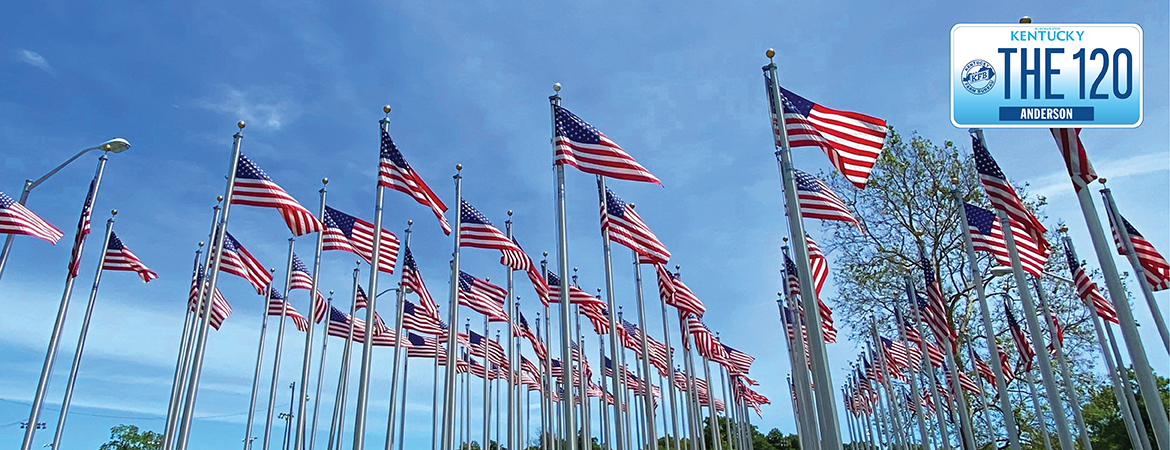
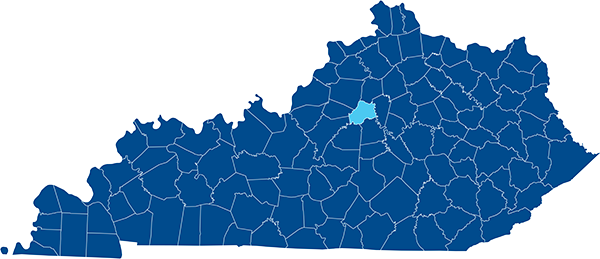 Framed by the verdant hills of the state’s Bluegrass Region, Anderson County, Kentucky, is a picturesque place to pass some time. While the region is notably famous for two well-known distilleries, Wild Turkey and Four Roses, there are lesser-known gems to uncover, too.
Framed by the verdant hills of the state’s Bluegrass Region, Anderson County, Kentucky, is a picturesque place to pass some time. While the region is notably famous for two well-known distilleries, Wild Turkey and Four Roses, there are lesser-known gems to uncover, too.
The beauty of the region is such that even a simple Sunday joyride can be entertainment enough. Or you can enjoy a sunset from the banks of Beaver Lake, test your skills at the Anderson County Community Park disc golf course, or hit the links at the Wild Turkey Trace Golf Course.
Back in town, the county seat of Lawrenceburg highlights the area’s rich history. Grab a coffee at Off the Ground Coffee House and stroll the historic downtown where charming storefronts beckon to shoppers. Heavens to Besty! Bakery was recently recognized by Yelp for serving up the “best sandwiches in Kentucky,” but locals say you should try the jambalaya soup, too. This popular eatery is located on the ground floor of the Anderson Hotel, which is claimed by many to be haunted. Extravagant architecture abounds on South Main Street, where a handful of bourbon barons constructed homes in the late 1800s and early 1900s. Soak in the history of these estates “Built by Bourbon” using the informational banners located along the sidewalk. Make sure to stop by Lawrenceburg City Park for a moment of silence at the Healing Field, which pays tribute to Kentucky’s servicemen and women who have fallen in the War on Terrorism. The current field contains 119 flag poles, flags, and memorial plaques, each representing a Kentucky soldier who has given their life for our freedom.
When the weather warms up, Lawrenceburg really comes to life with its many fairs and festivals. Live music fills the air every Friday during the summer concert series at Century Bank Park, and classic cars line the streets for monthly cruise-ins April through October. In September, Stave Fest highlights local and regional musicians and artists during a two-day event. And, in the fall, burgoo takes center stage as revelers from far and wide gather for a taste of Kentucky’s most famous stew at the Burgoo Festival.
Last, but certainly not least (that is, if you’re the thrill-seeking type) is Vertigo Bungee, an experience unlike any other in the eastern United States. Adrenaline junkies can plummet toward the Kentucky River 240 feet below, safely affixed to a century-old railroad bridge. Bungee jumps can be booked only one weekend a month, May through October.
Hometown agents. Because personal service still matters.
For your convenience, Kentucky Farm Bureau Insurance has multiple agents located in Anderson County. Click here for more information.
The 120 is a blog series produced by Kentucky Farm Bureau Insurance highlighting each of Kentucky's 120 counties—because we're well-known for knowing Kentucky well.
The 120: Ballard County
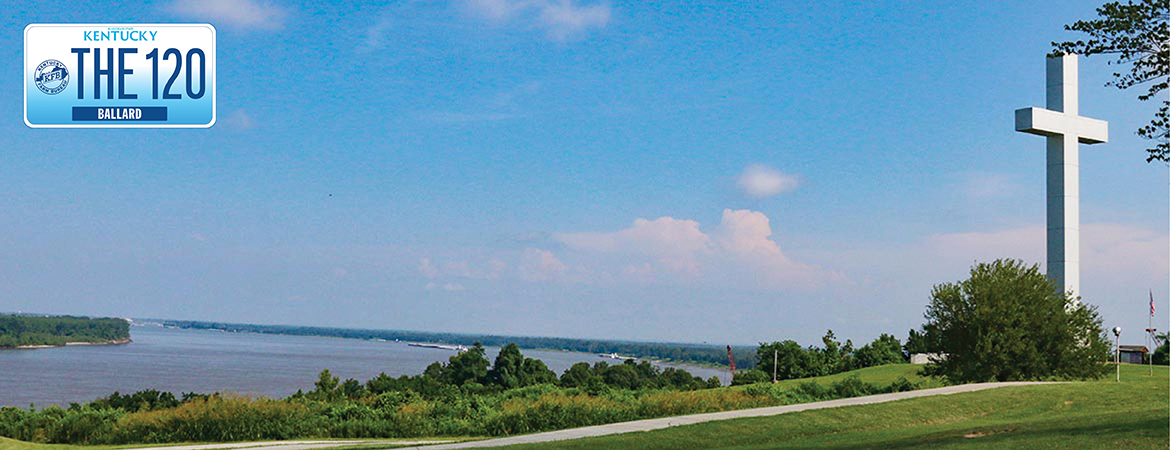
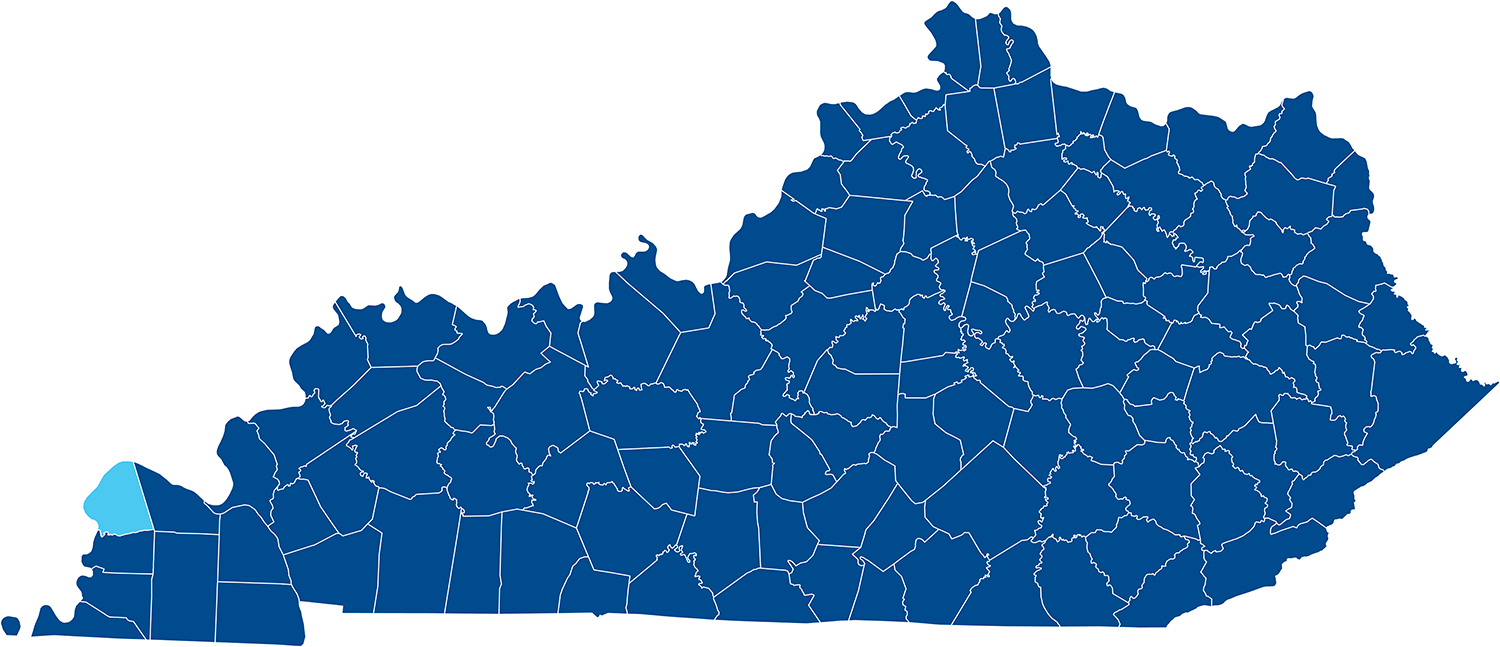 In the far western corner of Kentucky lies Ballard County, a rural region at the convergence of the Mississippi and Ohio rivers. Winding riverbanks and 30,000 acres of verdant land make Ballard County a haven for outdoor enthusiasts. One of the best ways to enjoy the county’s natural splendor is to visit the Ballard Wildlife Area, an 8,200-acre area in the Mississippi River floodplain that is open to the public from March 16 to October 14 annually. This area is characterized by oxbow lakes, bogs, grasslands, and tupelo and cypress swamps. Viewing opportunities are numerous for birds, mammals, reptiles, and amphibians—from raccoons, deer, and beavers to transient pelicans, wood ducks, and bald eagles. Maintained roads provide access to various observation decks and photography blinds, or the more adventurous souls can opt to explore via kayak or canoe, though be warned, some areas are quite remote and are home to venomous cottonmouth snakes (also known as water moccasins).
In the far western corner of Kentucky lies Ballard County, a rural region at the convergence of the Mississippi and Ohio rivers. Winding riverbanks and 30,000 acres of verdant land make Ballard County a haven for outdoor enthusiasts. One of the best ways to enjoy the county’s natural splendor is to visit the Ballard Wildlife Area, an 8,200-acre area in the Mississippi River floodplain that is open to the public from March 16 to October 14 annually. This area is characterized by oxbow lakes, bogs, grasslands, and tupelo and cypress swamps. Viewing opportunities are numerous for birds, mammals, reptiles, and amphibians—from raccoons, deer, and beavers to transient pelicans, wood ducks, and bald eagles. Maintained roads provide access to various observation decks and photography blinds, or the more adventurous souls can opt to explore via kayak or canoe, though be warned, some areas are quite remote and are home to venomous cottonmouth snakes (also known as water moccasins).
It's worth noting that the nearby Axe Lake State Nature Preserve, though only accessible by written permission, is an unusual ecosystem in the state. It is known for its large, intact bald cypress-tupelo swamp, a landscape more commonly seen in southern coastal areas of the United States. This fragile biome is home to at least eight rare plant and animal species.
Back on land and out of the swamps, Ballard County is rife with history. The Wickliffe Mounds State Historic Site preserves an ancient Mississippian archaeological site. The museum offers a glimpse of the Native Americans who lived there and in other spots along the Mississippi River. These cultures, which farmed, hunted, and fished, built permanent homes and earthen mounds, the remnants of which can still be seen today. The largest intact mound at the site is known as the Ceremonial Mound, where political and religious activities would have taken place in the prehistoric Native American village.
The Barlow House Museum in nearby Barlow also opens a fascinating window to the past. This expansive, 11-room Victorian mansion was home to Clifton Jesse Barlow, his wife, and their seven children. The museum showcases the family’s unusual collection of 20th-century artifacts, furniture, crafts, and memorabilia.
The Fort Jefferson Site, overlooking the confluence of the Ohio and Mississippi rivers, marks the location of the first European settlement in far western Kentucky. It was a short-lived stronghold for protecting the western border of the United States during the Revolutionary War and, during the Civil War, offered logistical support and supplies for the Union Army. In the 1990s, dozens of local churches worked together to build a 95-foot cross on the site, which is lit at night and can be seen from Missouri and Illinois.
Though the brilliance of Ballard County undoubtedly lies in its quiet, natural beauty, there are some must-stop spots if you’re enjoying the rural back roads and need a bite to eat. Smokey D’s Family Restaurant’s smoked meats are well-loved by locals and travelers alike, and Kentucky Hillbilly BBQ serves up tasty menu items like the “Hillbilly BBQ Tater” and “Pawpaw’s Coleslaw.” The Bluegrass Restaurant is a small-town spot with noteworthy service serving up catfish and fried green tomatoes, and Mimmie’s Pizza and Subs is the perfect stop for some pub food (try their smiley face fries, General Tso’s wings, or dessert pizza if you’re feeling fun!).
Hometown agents. Because personal service still matters.
For your convenience, Kentucky Farm Bureau Insurance has insurance agents located in Ballard County. Click here for more information.
The 120 is a blog series produced by Kentucky Farm Bureau Insurance highlighting each of Kentucky's 120 counties—because we're well-known for knowing Kentucky well.
The 120: Barren County
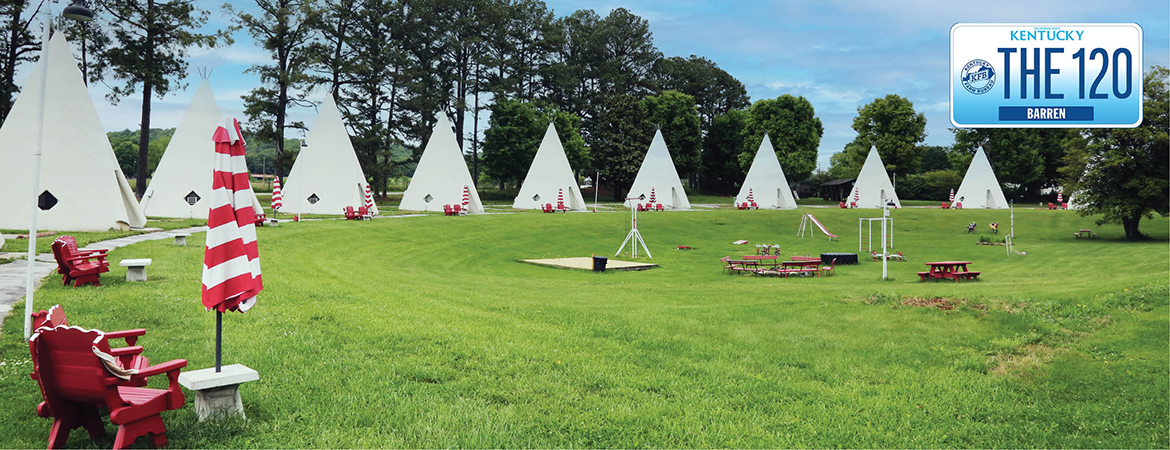
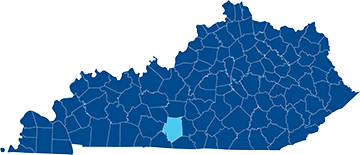 Outdoor enthusiasts, young families, and roadside stop aficionados will adore the versatility of Barren County, Kentucky.
Outdoor enthusiasts, young families, and roadside stop aficionados will adore the versatility of Barren County, Kentucky.
The county’s extensive karst geology makes it a hot spot for caves. No matter the weather, a cave tour is a great option—the temperature remains around 58°F, a welcome reprieve from the sweltering heat of Kentucky’s summers and a bit of a warm-up on a freezing winter day. There are several unique underground worlds to discover in Barren County. Explorers have been visiting Diamond Caverns for more than 165 years. These caverns are known for their dazzling array of glittering formations, thus the name. Guided one-hour tours are offered year-round, but be warned: This tour is considered strenuous! If you’re looking for something a little more easygoing, the folks at Jesse James Riding Stables & Outlaw Cave host 30-minute, non-strenuous cave tours that are wheelchair accessible. Crystal Onyx Cave, established in 1960, is family-owned and operated, and their passion shines through! Visitors rave about the dedicated guides and fun experience. The area’s most well-known underground attraction, Mammoth Cave, spans several counties, with the majority of the National Park located right over the county line in Edmonson County.
Back above ground, lake lovers will enjoy Barren River Lake State Resort Park. The 10,000-acre Barren River Lake serves as the centerpiece for a 51-room lodge, complete with a restaurant, pool, tennis courts, 18-hole golf course, and more. Rent a pontoon or a kayak from Barren River State Dock and explore the lake by boat, or relax on the beach, cast a line, or bike along the two-and-a-half-mile paved loop. Nearby, the old growth forests of Brigadoon State Nature Preserve are home to rare wildflowers and more than 120 bird species.
Barren County is a mecca for making memories with kids. At Mammoth Valley Park, you can take a scenic chairlift ride to the top of a mountain and then ride an alpine slide back down. Zipline through lush woodlands and over open meadows or tackle an aerial challenge course at Adventures of Mammoth Cave. Meander among giants and pose for epic family photos at Dinosaur World, which features more than 150 larger-than-life replicas in a natural setting. In warmer months, rent a cabin or pitch a tent at Yogi Bear’s Jellystone Park ™, a kid-centric campground with an inflatable waterpark, two swimming pools, and daily activities such as dance parties, movie nights, and tie-dye workshops. For a unique overnight stay, sleep in a wigwam at Historic Wigwam Village No. 2, an eye-catching roadside attraction. The village is one of only three surviving Wigwam Villages of seven built around the country before 1950. It is listed on the National Register of Historic Places and is undergoing renovation to bring it back to its 1930s splendor and authenticity.
While Barren County’s natural offerings are aplenty, there’s a lot of fun to be had in town, as well. Before your big day of adventure, grab some caffeine and a bite on the square at Fine Arts Bistro or The Hive Coffee & Bakehouse. Locals love Ritter House and Gale n Dale’s, and for good reason! Enjoy southern cooking served up with a side of southern hospitality at one of these buzzing diners, both serving breakfast and lunch only. For dinner, stop into A Little Taste of Texas, known for its ribeye sandwiches and pecan cobbler, or grab a specialty hot dog at The Dog Pound Restaurant and Smokehouse.
For entertainment, check the events calendar at the well-preserved Plaza Theatre, a downtown Glasgow mainstay since 1934. The Grove is an outdoor venue that hosts live music among the cedar trees every Friday and Saturday night, and Yancey’s Gastropub & Brewery is a lively little spot in a historic building, complete with a rooftop amphitheater.
Of course, while you are in the area, be sure to visit one of the Kentucky Farm Bureau Certified Farm Markets in Barren County: Britt’s Orchard, Kenny’s Farmhouse Cheese, and Sidden Farms Beef.
Hometown agents. Because personal service still matters.
For your convenience, Kentucky Farm Bureau Insurance has insurance agents located in Barren County. Click here for more information.
The 120 is a blog series produced by Kentucky Farm Bureau Insurance highlighting each of Kentucky's 120 counties—because we're well-known for knowing Kentucky well.
The 120: Bath County

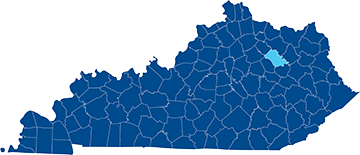 Nestled between the Bluegrass Region and the rugged hills of eastern Kentucky is Bath County, a rural haven for history buffs and nature lovers.
Nestled between the Bluegrass Region and the rugged hills of eastern Kentucky is Bath County, a rural haven for history buffs and nature lovers.
The county was named for its natural mineral springs, most notably Olympian Springs (originally known as Mud Lick Springs), once the site of a lavish resort and spa where guests flocked in hopes of curing common ailments. Kentucky's first stagecoach route, which opened in 1803, transported Lexington townsfolk to the springs and back. Trips departed weekly on Thursday mornings at 4 a.m., with stops in Mount Sterling and Winchester. This route was particularly popular during the cholera outbreak of 1833, as many Lexingtonians sought solace at the springs.
When the Civil War erupted, the Battle of Mud Lick Springs occurred there, lasting around three hours and resulting in a Union retreat. During this battle, Confederate soldiers burned several buildings at the Olympian Springs Resort to prevent their continued use as Union quarters.
Later, in 1876, the area found itself in the news once again. On March 9, a headline in the New York Times read: “FLESH DESCENDING IN A SHOWER,” followed by the subheading: “AN ASTOUNDING PHENOMENON IN KENTUCKY - FRESH MEAT LIKE MUTTON OR VENISON FALLING FROM A CLEAR SKY.” Story has it that Rebecca Crouch was making soap in her yard when “meat which looked like beef began to fall around her … like large snowflakes.” Though various theories have emerged over the years (Vulture vomit? Cyanobacteria? A supernatural occurrence?), the exact source of the rancid rain remains unknown. A preserved chunk of the original mystery meat is stored at the Monroe Moosnick Medical and Science Museum at Transylvania University in Lexington. Tours of this museum are not available to the public.
In the late 1700s, Kentucky was a major producer of iron goods. Visit Bath County Park to see the Bourbon Iron Furnace, a centuries-old relic that still stands today. The sandstone block and steel furnace was erected in 1791 to smelt iron ore into a variety of items used by Kentucky’s early settlers, such as kettles, nails, and plowshares. This specific furnace even created cannonballs and other munitions used in the War of 1812.
It’s clear that Bath County is steeped in rich history. For an all-encompassing look at the county’s storied past, stop into the Bath County History Museum, located on the second floor of the courthouse in Owingsville. Hours are limited, so make sure to call ahead.
While Bath County’s history is certainly fascinating, there’s plenty to enjoy present day. The picture-perfect historic county seat of Owingsville hosts a variety of fairs and festivals throughout the year, including a May Day Festival, and, newly added in 2025, The Kentucky Meat Shower Festival. In the small community of Preston (population: ~500), thousands gather on the third Monday of October for Preston Court Days. This street fair features dozens of vendors and trading booths, all centered around The Store (formerly Blevins Grocery), one of the oldest, original country stores left in Kentucky.
The area’s lush, mountainous terrain is a playground for outdoor enthusiasts. More than a million annual visitors enjoy the sights within Daniel Boone National Forest, an oasis for camping, horseback riding, hiking, birding, rock climbing, boating, fishing, and more. This protected forestland is known for its old-growth hardwood forests, steep ridges, narrow ravines, and sandstone cliffs, which can be experienced on over 600 miles of trails. Bring your ATV and navigate the rugged ridgetops of Bath County via White Sulphur ATV Trail, which boasts a 17-mile trail system that’s accessible to off-roaders between May 15 and November 30 annually. The trail is designed for novice to intermediate riders.
For hunters, the Pioneer Weapons Wildlife Management Area offers a unique challenge in the form of traditional weaponry. This 7,610-acre tract is designated for hunting with the same tools and methods as early pioneers and Native Americans. Hunters must use "primitive weapons," like muzzle-loading firearms, bows, or crossbows.
Another great way to traverse the area is on horseback. Equine enthusiasts will enjoy Rudy’s Ranch and Horse Camp, a horse-friendly campground with more than 30 miles of riding trails, a riding arena, and horse stalls.
In the warmer months, enjoy Cave Run Lake, widely recognized as the Muskie Capital of the South. Muskie (sometimes also spelled musky) is short for muskellunge, one of the largest species of freshwater fish native to North America. Just how big do muskie get? The Kentucky state record muskie was caught at Cave Run Lake in 2008, weighing in at 47 pounds and measuring a whopping 54 inches!
Enjoy a refreshing dip or paddle the serene waters, then wind down fireside at Zilpo Campground, which sits on an elevated peninsula that juts into the lake. Camping not your thing? Check out Posh Pines Glamping at Outpost Campground, where you can enjoy the serenity of nature and cool off in the AC after a long day of exploring. Visitors have access to Wi-Fi, a pool, a playground and dog park, and a pickleball court.
Of course, you’ll need fuel for all your outdoor adventures. In Owingsville, load up on the buffet at Willoughby’s Down Home Restaurant, known for its southern hospitality, or grab bubbling hot pizza or pasta from Sherrie’s Pizza House, a beloved local gem. For dessert or a quick bite on the go, pull up to Erma’s Dairy Bar, a classic dairy stand serving up tasty frozen treats, burgers, fries, and more. Please note that Erma’s is only open during spring and summer. Similarly, you could pop into Frosty Freeze of Midland, which serves ice cream—as the name suggests—but you’ll also find hearty southern favorites on the menu, like soup beans, country fried steak, and meatloaf. In the community of Salt Lick, Ky., try out the Salt Mine Restaurant & Café, a quaint café that boasts home-cooked breakfast, lunch, and dinner. Located in the same building is Debbie’s Music Theatre, often filled with the sounds of fiddles, banjos, and mandolins. With a family-friendly atmosphere and an open dance floor with plenty of room to cut a rug, there’s no better way to experience an authentically Appalachian evening.
Hometown agents. Because personal service still matters.
For your convenience, Kentucky Farm Bureau Insurance has insurance agents located in Bath County. Click here for more information.
The 120 is a blog series produced by Kentucky Farm Bureau Insurance highlighting each of Kentucky's 120 counties—because we're well-known for knowing Kentucky well.
2025 Generation Bridge Leadership Summit
Corey Culbreth
Fallen trees: What's covered (and what's not) on your insurance policy
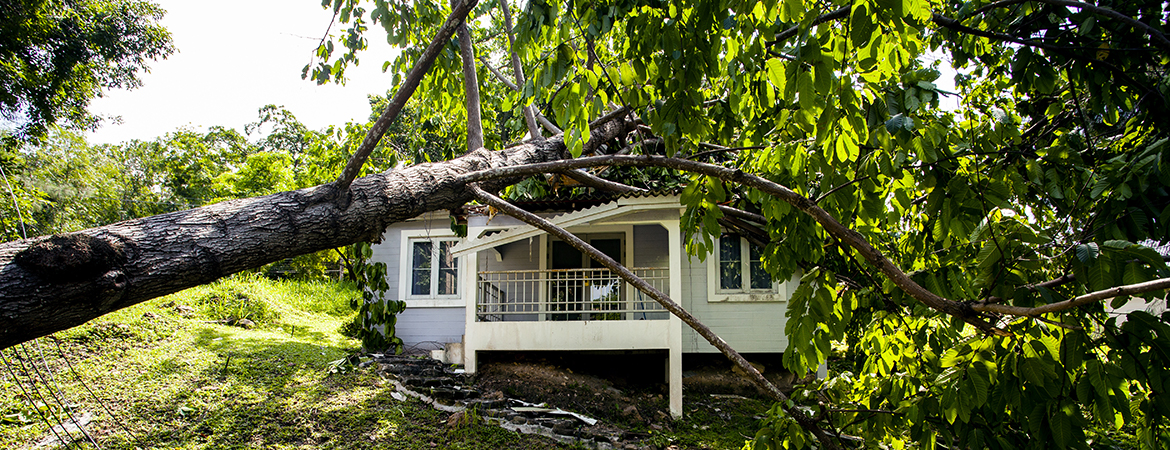
If anyone knows just how unpredictable the local weather scene is, it's us. Time and again, the agents and employees of Kentucky Farm Bureau Insurance have witnessed powerful storms that have caused all kinds of property damage across the state, sometimes taking out even the healthiest of trees and oftentimes leaving homeowners wondering how to pick up the pieces.
Hopefully, the following list of frequently asked questions regarding your responsibilities for property damage resulting from fallen trees can help shed a little light on some common scenarios. But we also know each situation can be unique, so reach out to your local Kentucky Farm Bureau Insurance agent for more information. Let’s get started…
Q. If a neighbor’s tree falls on my property, am I responsible?
A. Typically, any damage caused by a tree that falls on your property — regardless of where the tree came from — is your responsibility. So, if a storm causes neighbor Bill’s oak tree to fall onto your property and damage your roof, you will need to file a claim with your insurance agent. The opposite is also true. Say your poplar tree is struck by lightning and falls onto Bill’s roof. Bill will need to file a claim with his insurance company to cover that damage.
However, if the fallen tree was poorly maintained or diseased and the owner took no steps to take care of it, the owner or their insurer could be responsible for the damages. If your neighbor or neighbor’s insurer makes a claim against you, the best practice is to call your insurance agent.
Q. If a wind storm knocks down a tree on my property, does homeowners insurance cover the removal of the tree?
A. The answer depends on the situation. If a tree hits an insured structure, like your house or storage building, your Kentucky Farm Bureau homeowners policy likely covers the cost of removing the tree from the damaged structure. (There also may be additional coverage for debris removal up to $500 to remove the fallen tree(s) from the premises.) Again, call your insurance agent to determine what coverages, if any, apply.
However, if the fallen tree did not land on any insured structures, then the clean-up is generally your responsibility.
Q. If a fallen tree lands on my car, will my homeowners insurance policy cover it?
A. Your homeowners insurance policy will not cover the damage to your car, but your auto policy possibly will – as long as you have “other-than-collision” coverage with KFB. Remember, you will need to file the claim with your insurance company regardless of where the tree fell from. So, even if your neighbor’s tree fell into your driveway, it’s still your responsibility to file the claim.
Q. If a fallen tree lands on my detached garage or storage building, will my homeowners insurance cover it?
A. If the tree was felled by an accident or weather, your standard homeowners insurance policy, in most cases, should cover the damage to detached buildings. However, if you have a beloved garage or hobby shed out back, we suggest you call your local agent today to ensure that it would be covered in its entirety under your existing policy.
Q. Should I start making repairs before you inspect the damage?
A. In this case, you’ll be eager to start putting your home back together, and you should take steps to protect your property from further damage — cover broken windows and gaps in the roof or exterior walls, etc. Otherwise, it is important for an inspection to be completed by a claims representative before repairs are performed to identify all of the damages that may be covered by your policy, ensuring the estimate for damages is accurate.
Q. If my home is uninhabitable, will you cover a hotel stay?
A. If your policy has additional living expenses coverage and a direct physical loss makes your home uninhabitable, then we will pay for the reasonable increase in living expenses necessary to maintain your normal standard of living. Check your policy for coverages and limits, and keep receipts for additional living expenses that you pay out of pocket. A claim representative or your local Kentucky Farm Bureau Insurance agent can answer any additional questions about this coverage.
Q. How can I be proactive?
A. Taking care of trees before a disaster strikes can prevent potential problems and save you the cost and trouble of cleanup and repairs. Keep trees trimmed, remove dead branches, and consult a professional if you are worried about the condition of your greenery. Arborists can examine trees for subtle signs of trouble that you may otherwise overlook, including issues like underground root disease, according to the Insurance Institute for Home and Business Safety. This can save you a lot of hassle in the long run (and it may save your relationship with any nearby neighbors, too).
Do you have a question that was not answered here? Your local Kentucky Farm Bureau Insurance agent would be happy to discuss any concerns you have regarding trees, property damage, and your specific policies.
*The questions and answers above are provided as general guidance. The actual facts of the situation and the terms, conditions, and exclusions of the applicable policy will determine whether coverage applies.
>> At Kentucky Farm Bureau, we’re just as invested in your home sweet home as you are. We help protect what’s important to you – from farms and fishing boats to minivans and mobile homes. To see a full list of products we insure, click here.
8 ways to prep your home for summer vacation

Ready to pack up your summer clothes and leave work behind for a little while? Summer is the season for family time and fun in the sun, but don’t dive into vacation-mode before preparing your home first. According to the U.S. Department of Justice, household property crimes statistically occur at higher rates in the summer. This means that while you’re lounging at the beach or visiting family out of town, your home could be at risk.
As you ready your family for the summer adventures ahead, don’t forget to prep your home for your absence. Put your mind at ease by following these eight tips to prepare your home for summer vacation:
- Batten down the hatches.
Double-check locks on the windows and doors of your home before leaving. If you have a house alarm, be sure to set it!
- Light it up.
Set timers for one or two noticeable indoor lights, or just leave one on continuously. This should help maintain the appearance of a lived-in home. For the exterior of your dwelling, install an outdoor floodlight to fend off potential burglars.
- Keep up appearances… in the real world and online.
Consider paying for a lawncare service to maintain the yard if you will be gone for an extended period of time, and stop newspaper and mail deliveries. Long grass and piled papers are a dead-giveaway for an empty house.
Unkempt lawns and mounds of mail aren’t the only signs that nobody is home, however. Criminals are getting savvier every day, and social media activity could make your home an easy target. Don’t let your digital footprint tip off burglars to your absence. Refrain from posting on social media and broadcasting your absence when you are out of town.
- Prevent pests.
The last thing you want to come home to after a long trip is pests. Take action beforehand to prevent a buggy-takeover. Empty out all trash, especially if you’ve recently thrown away food, clean out perishable and open items from your fridge and pantry, and run your garbage disposal. Outdoors, if you have a pool, cover it and turn heat settings off to prevent bacteria and algae growth.
- Watch your water.
Turn off your water to prevent pipe leaks while you’re out of town, and double-check that nothing is already leaking before you go. These actions can help to prevent costly water damage, and you may even save some money while you’re at it. According to the U.S. Department of Energy, water heating can account for 14 to 25% of your home energy cost. When you know you’ll be away from home, set your water heater to “vacation mode” to help conserve energy and money.
- Be prepared for anything.
Test your smoke alarms and emergency response systems before departure, and unplug appliances like TVs and toasters in case of a power surge. Leave your air conditioning on, however, to protect your pets, plants, and furniture from heat and humidity.
- Notify your neighbor.
Give a spare key to a trustworthy neighbor or family member. Having someone to watch over your home, pets, and plants while you’re away will allow for peace of mind and more relaxation on your vacation.
- Inventory your home.
Create a written and photographic record of valuable items, and include information such as serial numbers, make, and model. Give a copy of your list to a family member and keep one for yourself. To be extra sure of your protection, call your insurance agent to clarify what’s specifically covered by your policy. For more information on home inventories, click here.
There can be a lot to do around the house before taking off for a summer retreat, so be sure to make a list — and check it twice! Prepping your home before your next vacation could save you time and money, and keep your focus on what truly matters: having a fun-filled time with your family and friends. From all of us here at Kentucky Farm Bureau Insurance, have a wonderful and safe summer vacation!
>> At Kentucky Farm Bureau, we’re just as invested in your home as you are. We help protect what’s important to you – from farms and fishing boats to minivans and mobile homes. To see a full list of products we insure, click here.
Check out the video below and subscribe to our YouTube channel for more Tools and Resources.
2025 Young Farmer Summer Outing Agenda
Kentucky Agriculture | Built to Last and Ready for the Future
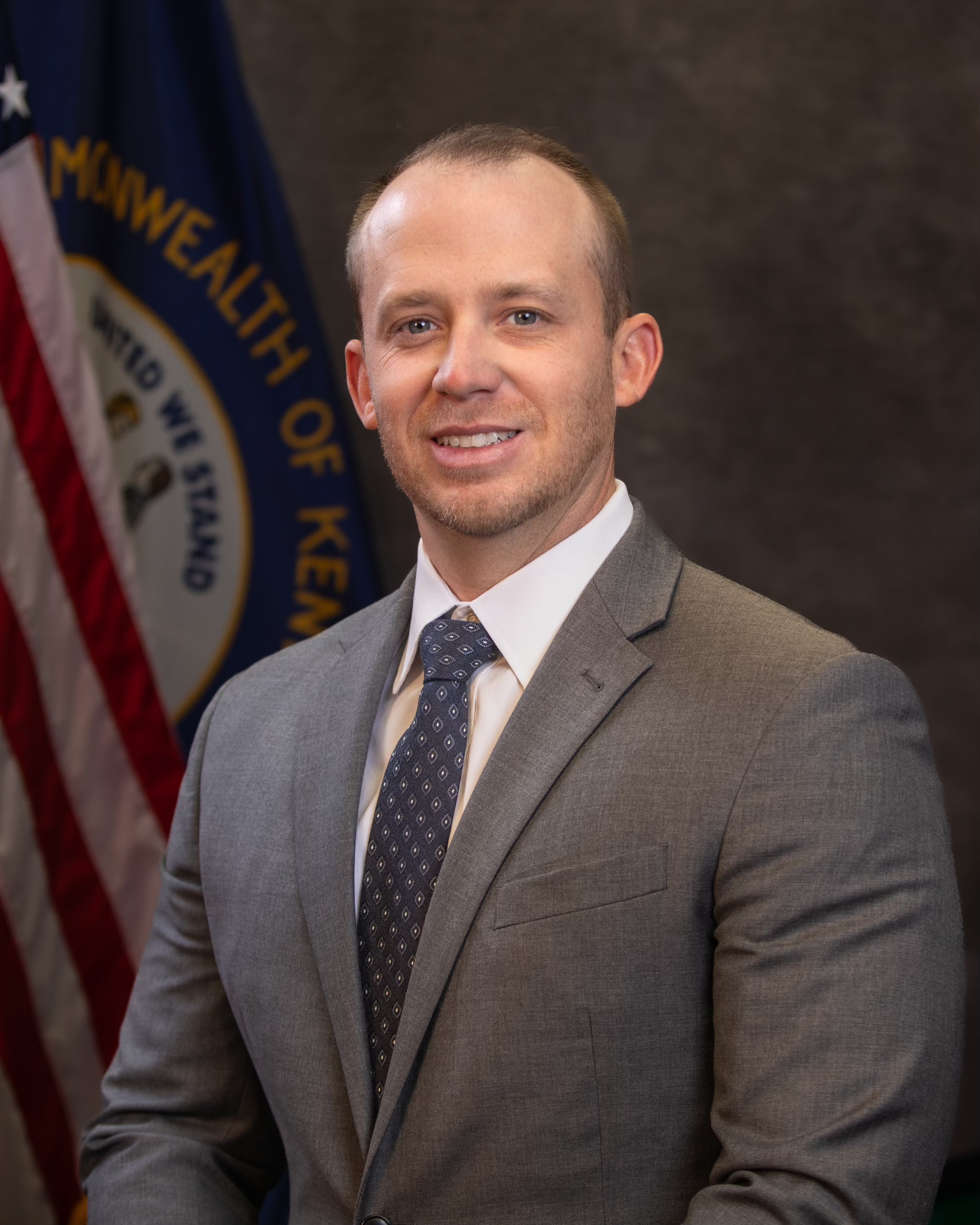
Kentucky agriculture is thriving.
In 2024, we reached a new milestone—$8.3 billion in agricultural cash receipts. That’s not just a number. It’s a clear reflection of the strength and innovation of Kentucky’s farm families. And it represents only a portion of agriculture’s estimated $49.6 billion impact on the state’s economy.
From poultry—our top farm commodity—to beef cattle, where we lead the nation east of the Mississippi, to staple row crops like corn and soybeans that each generate over $1 billion annually, Kentucky agriculture is a story of diversity, resilience, and growth. Nearly half of our total acreage is dedicated to agriculture, and no matter where you go in the Commonwealth, you’ll find it—on livestock farms, in greenhouses, and at bustling farmers’ markets. Agriculture is our way of life. It’s who we are.
But the agricultural landscape in Kentucky looked very different three decades ago. Back then, tobacco was king. It contributed nearly 25% of the state’s annual agricultural cash receipts. It defined small towns, seasons, and livelihoods. From planting to harvest, it marked the rhythm of life in rural Kentucky. Tobacco festivals, parades, and pageants were woven into our cultural fabric.
That began to shift in the late 1990s with the Tobacco Master Settlement Agreement. Kentucky, along with other states, reached a landmark agreement with major tobacco companies. As part of that settlement, Kentucky committed to diversifying agriculture and helping farm families adapt to changing times.
Since the first payments were received, Kentucky has directed half of its $2.8 billion in settlement funds to Early Childhood Development and the Kentucky Health Care Improvement Fund. The other half has been invested in agricultural diversification—thanks to the work of the Kentucky Agricultural Development Board (KADB), the Kentucky Agricultural Finance Corporation (KAFC), and the Kentucky Office of Agricultural Policy (KOAP).
These organizations, and the dedicated board members who serve them, have made it possible for our farmers to expand, innovate, and try new things. We’ve seen major investments in local food systems, agritech, and infrastructure that support a more resilient agricultural future.
Tobacco still plays a role in Kentucky’s economy. We continue to lead the nation in burley, fire-cured, and dark air-cured tobacco production. In 2023 alone, Kentucky tobacco generated more than $200 million in farm-level receipts. It’s a part of our story—and a part of our future.
But it’s no longer the only story.
Today, Kentucky’s agriculture is built on a foundation of innovation and diversification. We’ve embraced change to ensure our farmers not only survive but thrive. And as we mark 25 years of investing settlement funds into the diversification of Kentucky agriculture, we’re better positioned than ever to take on the challenges of the next 25.
We owe it to our farmers, our families, and future generations to keep pushing forward. Because in Kentucky, agriculture isn’t just an industry—it’s a legacy worth protecting and a future worth building.
Jonathan Shell
Kentucky Agriculture Commissioner
President's Column | I Want Our Farming Legacy to Continue for Generations
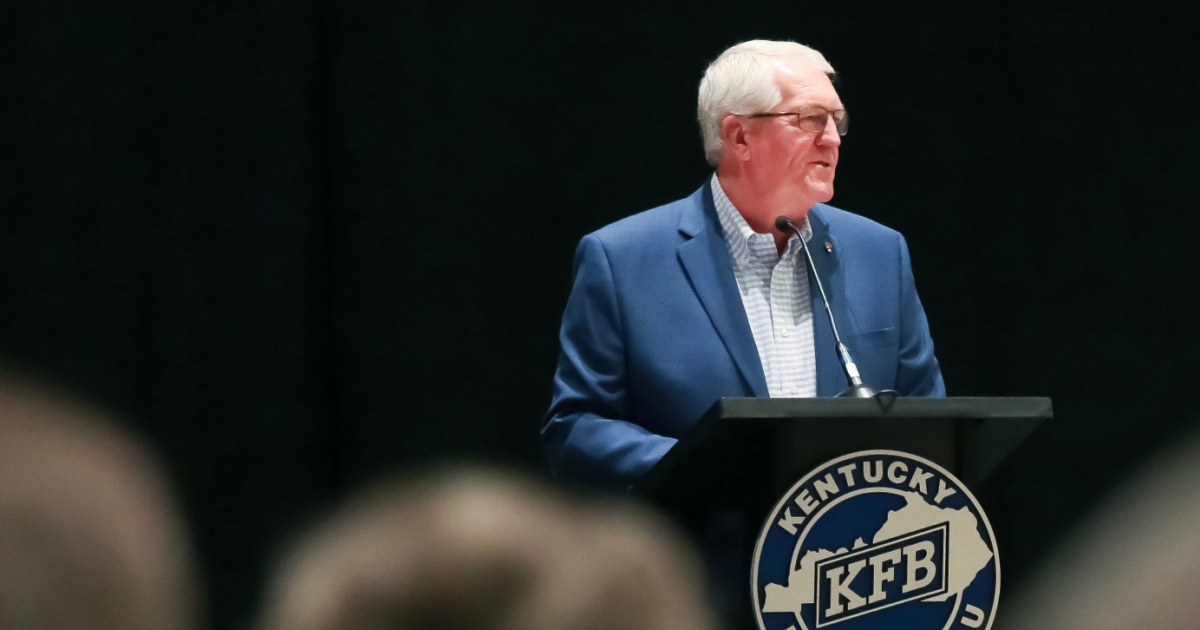
I want our farming legacy to continue for future generations
For many folks, July is a month of relaxing on vacations, family cookouts, and patriotic love for our great nation as we have just celebrated another Independence Day.
With all of the activities that surround us this time of year, it could be easy to forget the generations on the farm who came before us and the sacrifices they made to make our lives better.
In reflecting on the five generations of my family on our farm, knowing their history and how hard they worked to till the ground, grow a crop, raise and care for livestock, and feed themselves—and often their neighbors—gives me a sense of pride and determination. I want our farming legacy to continue for future generations, as most farm families do.
Every day when I step out my front door, looking over our farmland, I’m thankful for the opportunity to be here and do what I do. Granted, some growing seasons are better than others, but each season is a tribute to those who have paved the way for me.
Each crop is a testament to the farmers who worked the soil with a wooden plow and a team of horses or mules. Thanks to our state ag statistics office, I read that over three million acres of corn were planted by Kentucky farmers in 1926.
Can you imagine the labor hours it took to plant that much… way before any of the technology we use today on the farm was even dreamed about?
One main thing all farmers from the past and today have in common is, it’s their life’s work to live and make a living on the farm, no matter how hard it gets or the season they’re having.
They, too, have stepped out their fronts doors and looked over the land and felt the pride of knowing they are farmers. Their value to society—along with that of our service men and women and first responders—cannot be overstated.
Unfortunately, those of us on the farm can often be forgotten by those who don’t have a knowledge of where their food comes from or what it takes to produce it. As long as they see stocked shelves in the grocery stores, how it got there might never cross their minds.
It’s our job at Farm Bureau to constantly remind the people who eat the food we produce and make the laws that oversee our industry just what farming is about; what it takes to get from the soil to the supermarket; what challenges we face to stay on the farm on a daily basis.
Most of all, if they do a little genetic investigation into their own families, they will most likely discover a farmer somewhere in their heritage.
And when they do, I hope they gain a better understanding of why the American farmer is so needed in this world and be thankful for all who have planted, grown, and harvested the crops we enjoy today, and for those who grew the crops that came before us.
My prayer is that each of you have a blessed and safe summer, and that you take a little time to be thankful for all the farm families who, over many generations, have made life possible in this great country.
Eddie Melton, President
Kentucky Farm Bureau
Kentucky Farm Bureau Names 2025 Farmer of the Year Finalists
Kentucky Farm Bureau (KFB) today announced the finalists for its 2025 Kentucky Farmer of the Year award. This annual program recognizes an individual for their outstanding agriculture operations, as well as their service and leadership both on and off the farm.
The three finalists are: Mark Metcalfe of Hopkins County, Scott Porter of Mason County and Mike Wilson of Anderson County. Finalists were selected after a rigorous application process. Applicants must be a Farm Bureau member to be eligible for the award.
“Each of these outstanding farmers is very deserving of this honor,” said KFB President Eddie Melton. “Mark, Scott and Mike all show an unwavering commitment to excellence in agriculture, efficiency in their farming operations, and a high level of business and financial expertise. While there can only be one award given, we believe they are all winners in our industry.”
The finalists will be recognized during KFB’s Ham Breakfast at the Kentucky State Fair on Aug. 21. The winner will be announced on Oct. 2 and then recognized during the organization’s annual meeting in December.
MORE ABOUT THE FINALISTS
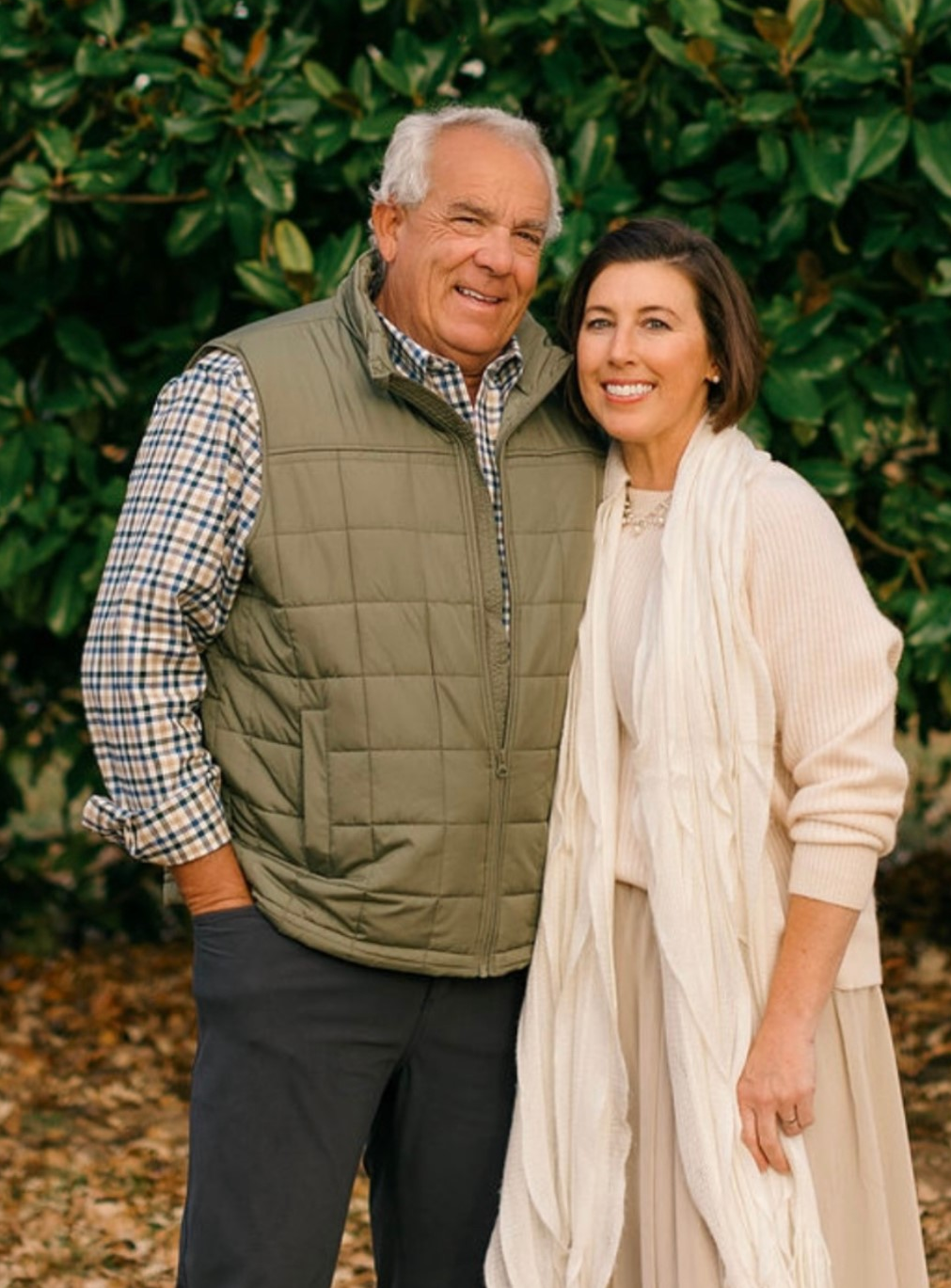
Mark Metcalfe and his wife, Penny, operate Metcalfe Florist & Pleasant View Greenhouses in Madisonville. Operations include 20 wholesale greenhouses, a garden center, commercial landscaping business, and a florist/gift shop located on about 100 acres. The Metcalfes have spent years updating the infrastructure of the farm’s greenhouses, originally built by Mark’s grandfather. These improvements maintain the heritage and integrity of the original business while also utilizing new technology such as installing solar panels for better energy conservation.
“We look for ways to diversify in the areas we are already working, increasing efficiency, and production growth within our physical footprint. We believe this will bring the best agriculture tourism experience to our county,” Mark says.
He began working on his family’s farm at age 10 and has never looked back. The couple’s two children also worked on the farm when they were young but have since moved on to other careers.
Just like many others in the agriculture industry, Mark has faced challenges like labor shortages and adverse weather conditions, but he’s met them head on to find solutions. And, even after decades in agriculture, the Metcalfes are still excited about the future of their operation.
“Penny and I enjoy each day as our workplace evolves,” Mark says, adding that his wife’s “ideas and talents keep us always changing and moving forward. When you love what you do, it is hard to ever think about doing anything else.”
Through all his efforts, Mark is well on his way to achieving his goal of “bringing a fresh and modern feel to all of our farm’s practices and facilities,” while maintaining its legacy.
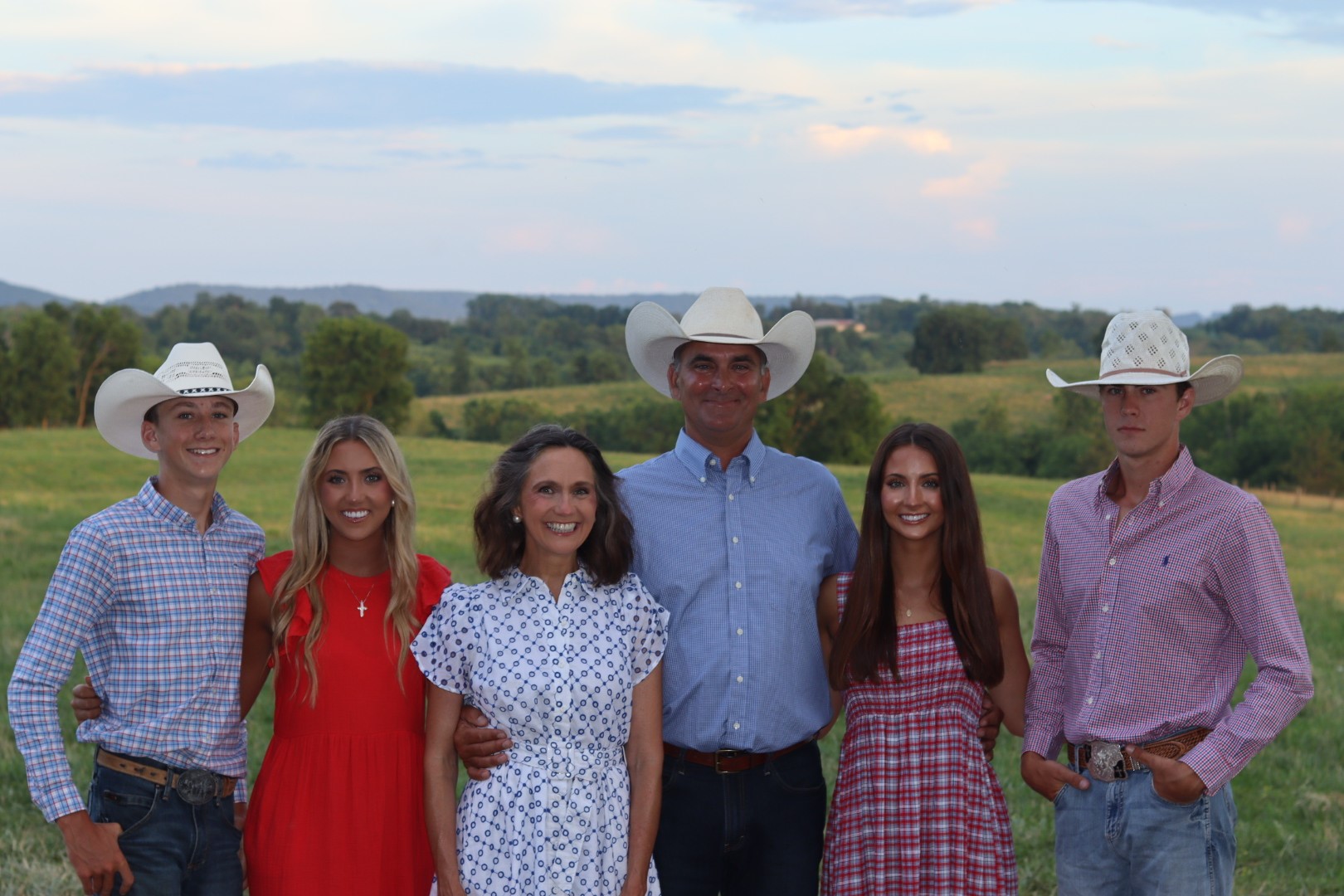
Scott Porter operates Springdale Stock Farms LLC on 1,775 acres of pastureland in Maysville. A full-time cattleman, his 900-head commercial beef cow herd is bred to high-quality Angus bulls to produce top-tier steers and replacement females. Over the last five years, he has reduced the scale of his business to focus solely on his own cow-calf herd. For the previous 20 years, Scott operated a combination of cows and purchased calves, and at its peak, the farm reached 5,000 head per year.
Scott says he gained valuable experience and knowledge during that time. “These years spent in a fast-paced buy-and-sell environment provided an opportunity to experience and learn many aspects of the cattle business, which I don’t think many producers ever do,” he says. “The successes I had also brought financial security to my family and a debt-free cattle operation today.”
Today, Scott is focused on continuous improvement, which includes further streamlining his operation. To increase the carrying capacity for cattle on his land, he has completed soil testing, developed some rotational grazing pastures and cleared and reseeded large areas of the farm.
Scott is also focused on improving efficiency from a labor standpoint: “We need to do more with less.”
Scott and his wife, Mary Ann, have four “healthy, happy and intelligent children.” Their 21-year-old son recently joined them at the family farm full time. “He brings a great work ethic, abilities and an understanding for the care of cattle that only people growing up in the business have,” says Scott.
Scott is passionate about helping to ensure that younger generations of cattlemen and women succeed. “I want to share 20-plus years of education in backgrounding and finishing cattle,” he says. “Making a living buying and selling cattle works better if you understand what you bought today and its potential down the road, especially at harvest.”
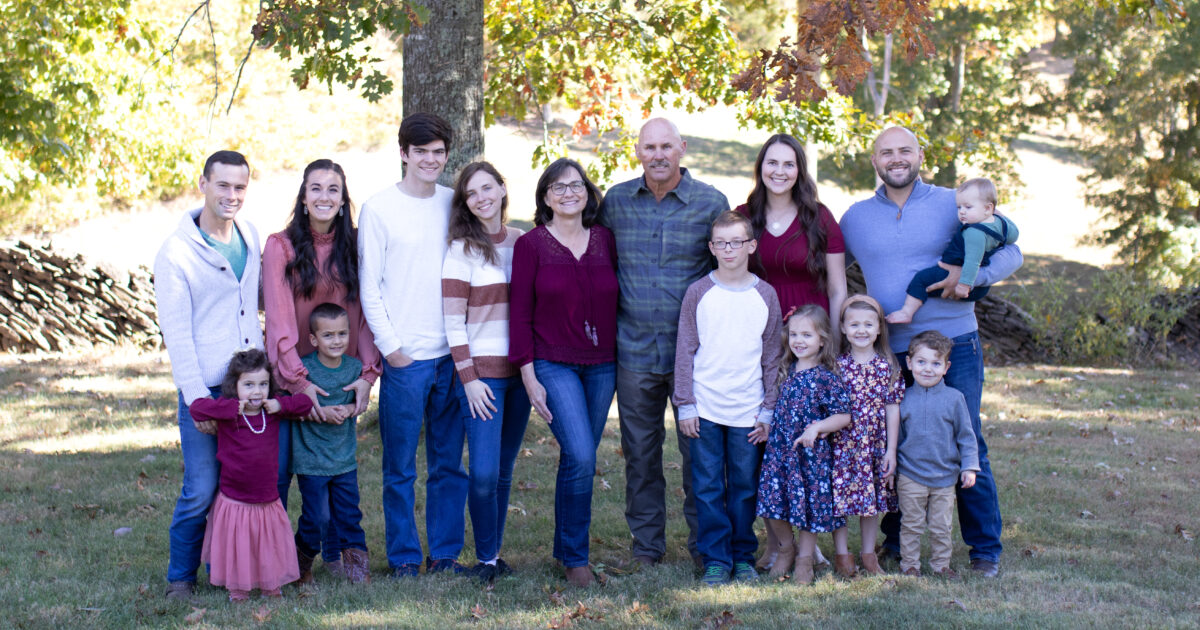
Mike Wilson operates Whispering Hills Farm, a commercial beef cattle and hay production farm on more than 250 acres in Lawrenceburg. He has strategically expanded his farm over the years, acquiring adjacent land and purchasing dedicated hay fields in neighboring Franklin County. Further expansion in the early 2000s allowed him to increase his cattle herd while also contributing to the preservation of agricultural land in the area.
Mike’s deep-rooted passion for agriculture began in 1969, when he started farming alongside his father, raising and milking dairy cattle. “This early immersion in the daily rhythms and responsibilities of dairy farming laid the foundation for my lifelong connection to the land and livestock,” he says.
He pursued opportunities outside of agriculture after graduating high school in 1976 but returned home in 1999 to purchase his family farm and embark on building his own beef cattle operation.
Specializing in high-quality commercial breeding stock, Mike primarily markets both open and bred female heifers through private treaty sales. “This personalized approach allows me to directly connect with buyers, understand their specific needs and showcase the superior genetics and potential of my heifers,” he says.
Demonstrating a commitment to continuous improvement and sustainable practices, Mike actively participates in University of Kentucky field trials focused on herbicide application and the establishment of diverse grass species to enhance biodiversity within his hay fields. “This proactive engagement is crucial to my pursuit of optimal hay quality, as a diverse mix of grasses contributes to a more nutritious and resilient forage,” he says.
Mike Wilson's dedication to environmental stewardship has been recognized through numerous prestigious awards, culminating in the esteemed 2024 Leopold Conservation Award, which honors landowners who demonstrate exceptional dedication to land health, natural resource management and biodiversity on their working farms. He was also named the 2025 National Cattlemen's Beef Association Environmental Stewardship Award Program regional winner.
Mike and his wife, Tamela, have four children, whom he is teaching the intricacies of the farming operation, with the intention to provide them with the skills to potentially take over the farm in the future.
Search
Enter some keywords below to search our site for content.
You could also try our site map to find pages.
We're Closer Than You Think!
Doing right by you because we live right by you. Find a Kentucky Farm Bureau county office or agent. Search by:
Kentucky Farm Bureau Federation
Kentucky Farm Bureau is a grassroots organization dedicated to serving our membership family and their communities. As the Voice of Agriculture, we identify problems, develop solutions, promote economic success, and enhance the quality of life for all.
Big On Commitment
Since 1943, people across the state have put their trust in Kentucky Farm Bureau Insurance. Today, we insure more than 474,000 Kentucky families and businesses. We have insurance agents in all 120 counties protecting what's important to our fellow Kentuckians, from farms and fishing boats to minivans and mobile homes.
With us you're not just a client, you're a member—and we treat you like one. You’ll receive all kinds of great benefits, like discounts on everything from hotels to security systems, and a company and local insurance agent committed to you.
Statement from KFB President Eddie Melton on Recently Passed Capital Gains Tax Relief
Kentucky Farm Bureau President Eddie Melton commented today on the inclusion of capital gains tax relief to help keep agricultural land in production in the recently passed One Big Beautiful Bill Act.
“We are excited to see the inclusion of capital gains tax relief in the One Big Beautiful Bill Act. This is a direct result of Senator Mitch McConnell’s efforts on the issue, which includes his legislation, the Protecting American Farmlands Act. This is a crucial first step in providing America’s farmers capital gains relief while incentivizing keeping farmland in the hands of active farmers. This will provide farmers with another tool when looking to transition their land while also addressing the drastic loss of farmland across the country. Senator McConnell has long been a champion for Kentucky agriculture, and this legislation is a testament to his commitment to the American farmer and the future security of America’s food supply.”
About Us
OFFICERS
| President | Glenn Burton | |
| Vice President | Tim Dalton | |
| Secretary/Treasurer | Grady Steele | |
| Farm Bureau Women's Chair | Sharon Denney | |
| Young Farmer's Chair | Ann Margaret Hughes |
DIRECTORS
| William Stevenson Allen | Monticello | |
| James Kelsay | Monticello | |
| Jimmy Martin | Monticello | |
| Bill Roberts | Monticello | |
| Jack Roberts | Monticello | |
| Dan Vickery | Monticello |